Is This Really Goodbye?
Much has been said of Hillary Clinton (and little spared) during her two decades in the public eye. Now, as she prepares to step down as secretary of state, the most accomplished and, arguably, misunderstood woman in recent history insists she's done with public life for good. Ayelet Waldman joins Clinton on a tour of duty in Africa to find out if she means it.
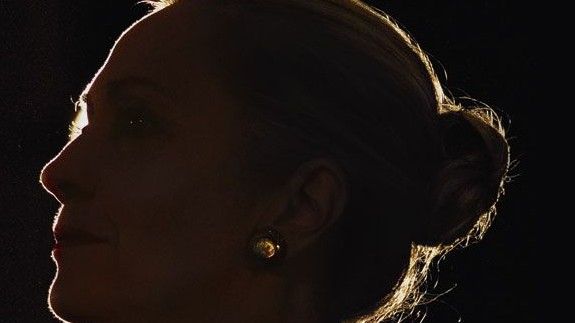
First lesson of traveling with Hillary Clinton: Her arrivals are always a mad dash, with a pool photographer and film crew tearing out of their press van to try to snatch an image of the secretary of state glad-handing a local dignitary before she's whisked inside, her aides and security detail rushing after her, the rest of the press corps in their wake. But in South Sudan the scrum is even more frantic than usual. The president of South Sudan is protected by a coterie of Manute Bol—sized bodyguards, who fling out their hands to block our way. As I maneuver unnoticed between two behemoths, a mouse scurrying between the legs of two elephants, a member of Clinton's security team snarls at one of the guards, Get your motherfucking hands off me or I will throw you down these stairs. I slip past them and into the room just as Clinton greets the president with a bright smile and a hug. Not, I can safely say, what this bear of a man, glowering beneath his signature cowboy hat, was expecting. The next day he agrees to open a disputed oil pipeline: Diplomatic mission accomplished.
I was accompanying Clinton on what may well be her final visit to Africa as secretary of state before she leaves the job in January, a farewell tour as it were, and South Sudan was our third country in as many days. The trip was to last another week, with another seven countries on the itinerary. Nearly every moment of her schedule was packed with events, but this day was by far the most grueling: After the meeting with the president, there was a press conference with the foreign minister, then a meet and greet with the staff of the U.S. embassy in Juba, after which the secretary jumped right back on the plane and headed to Uganda, where she met with that country's president, held another press event, visited a military base to be briefed publicly on a U.S.-Uganda joint drone program and then privately on other security matters, visited an AIDS clinic, presented an award to a coalition of Ugandan human rights workers, capping it all off with yet another meet and greet, this time at the Kampala Embassy. I need a cocktail and a nap even remembering that day, much of which I spent desperately hoping that the next stop would include a bathroom, preferably one that would not result in exposure to the Ebola virus outbreak that was just then being reported in every international newspaper.
Most of Clinton's workdays are like this, a daily treadmill of meetings and appearances, bookended by working dinners in hotel restaurants and one long flight after another. Even her plane is decidedly unglamorous. Though the communications and security systems are state of the art (Clinton can appear at any meeting, even one in the president's Situation Room, via video conference), the retrofitted 757 is surprisingly shabby. Because the plane carries all the supplies that will be needed for the entire 10-day trip, every available nook and cranny is crammed with food—cranberry juice containers, boxes of crackers, crates of fruit. Clinton's small private cabin in the front has a pullout couch that looks suspiciously like the futon I had in my college dorm room, and though her staff of aides, advisers, and security agents sits in comfortable business-class seats, the 10 or so members of the press are jammed into coach in the back. At the beginning of every trip, they draw lots for the best seats. When I once ended up with a winning number, I worried there would be some grumbling; after all, the reporters from the wire services spend their lives on the road, surely they deserve the aisle seat. But they are a good-natured (and hard-drinking) crew, and they gave up with nothing more than a sigh and a smile.
There is a kind of Kabuki formality to Clinton's interactions with me and all the members of the press corps. In intimate moments, like when she comes back to greet us in our cramped quarters, she seems to be engaged less in casual conversation than in acting out a simulacrum of a casual conversation. And even when she joins us for an ostensibly casual, off-the-record glass of wine, she is engirded by protocol. A woman who has been humiliated by the press (try Googling the words "Hillary" and "cankles"), she seems to take comfort in the traditional pomp of the role of secretary of state, even as her husband is famous for rebelling against such formalities. When she meets with the press, seats are allotted according to rank, food isn't consumed until she takes the first bite, and so I can't drink my tea because she isn't drinking hers.
Pity that poor press corps, dutifully filing stories about speeches at universities and economic forums, most of which are doomed to fill the back pages of their newspapers and wire services. All that exhausting effort, all that careful analysis, and it's a video of Clinton at a dinner given in her honor in South Africa, attempting the most polite and awkward grind any of us had ever seen outside of a middle school dance, that ends up going viral. As a veteran reporter told me, "The story is never what she said, as much as we want it to be. The story is always how she looked when she said it, or what she was doing when she said it." This has always been Clinton's particular cross to bear, and she has come to accept what she called in her memoir, Living History, "the significance of the insignificant." As Clinton told me, "I no longer fight it. I no longer complain about it. It's just what you have to live with."
And so by the fifth or sixth event on any given day, while the rest of us in Clinton's entourage look like we've been dumped out of a rain barrel, she is as polished and elegant as ever, comfortable and striking in one of her trademark pantsuits. The secretary is assisted by a "body woman," who is responsible for her bags, clothes, and anything else she might need during her trip. There would be just one moment on the entire tour when I caught Clinton looking less than impeccable. The flaw? A shiny nose, reddened ever so slightly by the sun and heat. My own hair was in a snarled mound on top of my head, my mascara had dripped down to my chin, and I was limping around on blistered feet, trailing Band-Aids and gauze like a Halloween mummy. But by then I—an early and avid Barack Obama supporter who had devoted more than a year working for his first presidential campaign, becoming in the process such a partisan that I was right there with Samantha Power when she famously called Clinton a monster—had already witnessed firsthand the almost spellbinding gravitas Clinton also commands, and was so invested in the myth of the secretary of state's effortlessly put-together appearance that I rushed to tell someone that she needed to powder her nose. Within moments, there she was, smiling for the camera, powdered to perfection.
Nowadays she dresses, it seems, for herself, sometimes in plain but well-cut pantsuits that flatter her size, but more often in eye-catching, jewel-toned jackets and vibrant silk tunics, cheerful colors that perk up the long slog from one event to another, one country to the next. Her hair, a topic of oddly obsessive public interest, is long, past her shoulders, a choice she made in favor of simplicity and ease. "When my hair was shorter, I used to get it done every couple of days ... but I got tired of that. It took an hour ... I let my hair grow because I'm on the road so much and there are so many different things [I] can do with it."
Stay In The Know
Get exclusive access to fashion and beauty trends, hot-off-the-press celebrity news, and more.
She most often wears her hair pulled back, a style that maddens certain male members of her staff, who worry that it makes her look too severe. The women are more forgiving, perhaps because they are exhausted by the endless fascination with her hair, or perhaps because they, too, are sometimes reduced by early bag drop times and broken hotel hair dryers to ponytails and buns. Personally, I like the ponytail. Altogether, I am impressed by Clinton's polish and in awe of her stamina.
I had started out the trip determined to avoid drinking the Clinton Kool-Aid, but by the end I was knocking it back like a giddy 6-year-old. It was Malawi that sealed the deal for me. We were visiting a Peace Corps project called Girls Leading Our World when 17-year-old Triza Lapani, wrapping a brightly colored chitenje around Clinton's waist, managed to crack Madame Secretary's carapace of firm, cool competence. Clinton stood with her arms raised as the girl spun around her. Her hair was soft around her face, and her smile was broad and honest. She seemed entirely at home, warm, even maternal, and I melted.
This—the fragile front line where childhood and politics meet—is, after all, where her career began four decades ago, when she worked as a young lawyer for Marian Wright Edelman, founder of the Children's Defense Fund. Though it is often overshadowed by seemingly more impressive bullet points in her biography, advocating on behalf of children and women has been Clinton's life's work, and she believes absolutely that the project of elevating the status of women is critical to nation building. "There is no doubt in my mind," she told me over tea and tiny cakes that I was too nervous to consume, "that without the involvement of women in the economy, in politics, in peacemaking, in every aspect of society, you can't realize [a country's] full potential."
Clinton's staff—both the career State Department employees and the roughly 100 presidential appointees she brought with her—initially reacted to this formulation with, she told me, a lot of eye rolling. But she persisted, insisting on including women-focused events in her schedule, raising the issue of women's rights in almost every speech and press event, and transforming the State Department's Office of Global Women's Issues into an institutional powerhouse. No other secretary of state has ever made women's rights as central an issue as Clinton has.
Many of the people surrounding Clinton are true believers who have worked with her since she was first lady. But what stuns most everyone—her Capitol Hill critics and colleagues alike—is how quickly she won over the outsiders, specifically those who may have bristled at the appointment of a woman whose bona fides in matters of global security and diplomacy came largely from her tenure as FLOTUS. Even the most entrenched State Department bureaucrats are now contented citizens of "Hillaryland"—a term coined by her inner circle ages ago, yet which still aptly describes the with-us-or-against-us bubble that she operates in. Ply a Hillary wingman with drinks and an overpriced steak and he'll invariably launch into a heartfelt, almost high-strung, monologue about his boss that telegraphs a fierce loyalty not unlike what Michael Corleone inspired. Clinton has a cadre of her own Tom Hagens who clearly respect her and, yes, probably fear her a little, too.
Defectors from Hillaryland are a rare species, which helps explain the epic dust storm kicked up by "Why Women Still Can't Have It All," last summer's cover story in The Atlantic written by Anne-Marie Slaughter, Clinton's former director of policy planning, in which she explained why she felt obliged to quit Clinton's staff. When I asked Clinton about Slaughter's claim that "juggling high-level governmental work with the needs of two teenage boys was not possible," Clinton's disapproval was palpable. She reminded me that she has spent her career advocating on behalf of women, that she is committed to the idea that "it's important for our workplaces ... to be more flexible and creative in enabling women to continue to do high-stress jobs while caring for not only children, but [also] aging parents." But, she said, Slaughter's problems were her own. "Some women are not comfortable working at the pace and intensity you have to work at in these jobs ... Other women don't break a sweat. They have four or five, six kids. They're highly organized, they have very supportive networks." By all accounts, this was precisely the kind of mother Clinton was to Chelsea—hands-on, prioritizing her child, and yet ever committed to work.
Clinton has very little patience for those whose privilege offers them a myriad of choices but who fail to take advantage of them. "I can't stand whining," she says. "I can't stand the kind of paralysis that some people fall into because they're not happy with the choices they've made. You live in a time when there are endless choices ... Money certainly helps, and having that kind of financial privilege goes a long way, but you don't even have to have money for it. But you have to work on yourself ... Do something!"
It's a credo Clinton lives by, though certainly anyone would sympathize had she responded to her peculiar circumstances with paralysis. But wallowing (or "whining," for that matter) has never been her thing. That's never been more evident than it is these days, as her capacity to convert bitter enemies into staunch admirers continues to surprise, no matter how many times she pulls off the trick. Reviled as a carpetbagger in her 2000 senatorial campaign, she trundled around upstate New York on a much-derided "Listening Tour," yet swept into office with a resounding 55 percent of the vote, a darling of dairy farmers in Oneida County and liberals on the Upper West Side alike. Of course, it wasn't just her platform that won them over. Does anyone really think she'd have been elected had she not worked her way into the public's heart as a woman wronged, a wife exemplifying the best kind of grace under the worst kind of pressure? But once in the Senate, she proved a deft politician, deploying an astonishingly effective strategy of respectful submission. Even Republican Senator Lindsey Graham, one of the House members who managed her husband's impeachment trial, has nice things to say about her. ("She handles herself in a very classy way and has a work ethic second to none.") And again, in 2008, after one of the ugliest presidential primaries in memory, replete with competing (and too often justified) allegations of racism and sexism, she became an Obama stalwart and the most popular member of his cabinet—more popular, by far, than he.
Clinton is open about the fact that it was her celebrity that inspired President Obama to insist that she take the job of secretary of state, over her own reservations. ("I said, 'No, no, no!'") The president offered her the post, she told me, because he needed to send out onto the international stage a person whose very presence would signal the importance the U.S. places on diplomacy and international cooperation. A person who brought with her the klieg lights of the international media. "He came into office at a time of such economic distress," she told me. "He had his hands full with trying to save the economy. And he knew that we had so much damage to repair around the world in foreign policy. I think that the president rightly concluded that 'I'm not going to be able to do this, so I've got to have somebody who already has an international platform ... somebody who would be able to get every door open.'" Clinton was in many ways the only choice. What other statesman (besides her husband) was as famous as Barack Obama?
Clinton's stardom and her uncanny ability to turn the most sour of lemons into the sweetest lemonade were in evidence throughout our time in Africa. She is not above recasting her failures into object lessons for the people she meets. To inspire local officials, she told stories about her own electoral defeats, saying, "I have won elections and I have lost elections. When you lose an election, it's important that [your supporters] see that the process was fair." She willingly trots out the most unpleasant memories to help her cause. In an unscripted moment, she told a group of South African students, "[When] my husband was president, people were saying terrible things about us both. I was beginning to think, Who do they think they are?" Again and again, at the AIDS clinics in Cape Town and the dairy factories in Malawi, she mentioned her husband (always "my husband," never "President Clinton"), leveraging his popularity and their mutual celebrity to further her message.
One of the most uncomfortable moments of our interview came when I asked her about her marriage. The discomfort, however, was mine, not hers. I debated not even raising the issue. But the fact is that, for many women, the Clintons' partnership of equals stands as both a model and a cautionary tale. We are still curious about it, even 14 years after its dissection on the floor of Congress. Given what the woman has been through with all the various "bimbo eruptions," culminating in the Monica Lewinsky debacle, and given the public's insatiable appetite for rumors, however vague, of her husband's continued infidelities, her grace in response to my probing was astounding. "You have to be true to yourself," Clinton told me. "You have to be enough in touch with who you are and what you want, how you want to live and what's important to you, to make your decisions based on that. Sometimes that's very difficult. Sometimes it's hard to have your own internal voice be heard ... it's hard because you've got society with expectations and you've got family, friends, and others who are expressing opinions. When you're in the public eye, it's like open season with the entire world. You have just one life to live. It is yours. Own it, claim it, live it, do the best you can with it."
Clinton has owned it, claimed it, and lived it. In her remarkable book about the 2008 election, Big Girls Don't Cry, Rebecca Traister describes a little girl sitting on her father's shoulders at a Clinton rally. The sign she's holding reads "Hillary '08, Sophia '40." Something about that image moves me terribly. So much so that, when I was describing it to a senior aide, a longtime resident of Hillaryland, I actually cried. After bringing me a tissue, the aide said, "I would like Hillary Clinton to be the first female president." And you know what? After spending 10 days watching Clinton kick ass all over Africa, and despite never before caring the slightest bit about Clinton's presidential aspirations, I've come to want that, too.
Clinton, however, was emphatic when I asked if she was planning to run in 2016. Laughing, she said, "You know? I am not."
"Why not?" I asked. "Everybody wants you to."
Her answer, when it came, felt honest, though it was hardly different from the answer given by numerous other politicians in the same position, all of whom have insisted they wouldn't run up until the moment they changed their minds. "I have been on this high wire of national and international politics and leadership for 20 years," Clinton said. "It has been an absolutely extraordinary personal honor and experience. But I really want to just have my own time back. I want to just be my own person. I'm looking forward to that."
"And you're really not going to leave the door open just a crack?" I asked. "For Sophia? For [my own daughter] Sophie?"
Again that warm laugh. "I'm going to be cheering them on. I hope to be around when we finally elect a woman president. That would be a great experience for me, to be up there cheering."
-
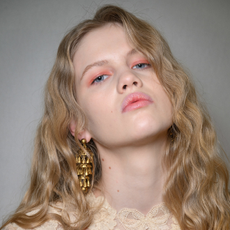 The Hottest Person You Know Is Probably Wearing This Unusual Perfume for Spring
The Hottest Person You Know Is Probably Wearing This Unusual Perfume for SpringThe season’s new signature scent.
By Ariel Baker Published
-
 Sydney Sweeney Glows in an Anti-Bridal Corset Dress
Sydney Sweeney Glows in an Anti-Bridal Corset DressThe newly single star looked snatched in Wiederhoeft.
By Hanna Lustig Published
-
 Princess Beatrice Is Following in the Footsteps of a Surprising Royal
Princess Beatrice Is Following in the Footsteps of a Surprising RoyalThe second-time mom has an incredible example in this regal figure.
By Kristin Contino Published
-
 The Historic Election Victories Worth Celebrating
The Historic Election Victories Worth CelebratingIncluding momentous firsts, abortion protections, and New York's "Equal Rights Amendment."
By Iris Goldsztajn Published
-
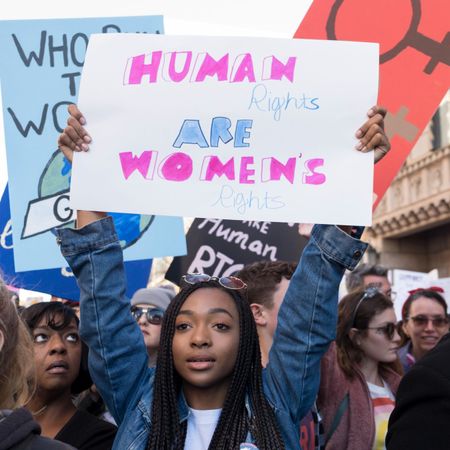 36 Ways Women Still Aren't Equal to Men
36 Ways Women Still Aren't Equal to MenFeatures It's just one of the many ways women still aren't equal to men.
By Brooke Knappenberger Last updated
-
 How New York's First Female Governor Plans to Fight for Women If Reelected
How New York's First Female Governor Plans to Fight for Women If ReelectedKathy Hochul twice came to power because men resigned amid sexual harassment scandals. Here, how she's leading differently.
By Emily Tisch Sussman Last updated
-
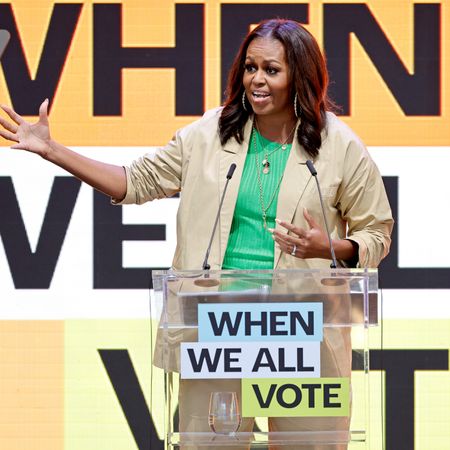 5 Practical Things You Can Do to Protect Democracy
5 Practical Things You Can Do to Protect DemocracyHow To Advice from top celebrities and Michelle Obama herself.
By Erin Geiger Smith Published
-
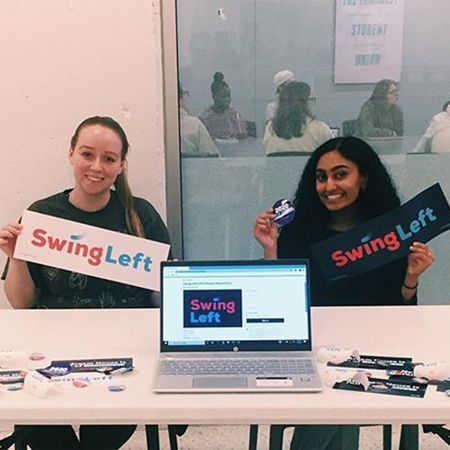 Why the 2022 Midterm Elections Are So Critical
Why the 2022 Midterm Elections Are So CriticalAs we blaze through a highly charged midterm election season, Swing Left Executive Director Yasmin Radjy highlights rising stars who are fighting for women’s rights.
By Tanya Benedicto Klich Published
-
 Tammy Duckworth: 'I’m Mad as Hell' About the Lack of Federal Action on Gun Safety
Tammy Duckworth: 'I’m Mad as Hell' About the Lack of Federal Action on Gun SafetyThe Illinois Senator won't let the memory of the Highland Park shooting just fade away.
By Sen. Tammy Duckworth Published
-
 Roe Is Gone. We Have to Keep Fighting.
Roe Is Gone. We Have to Keep Fighting.How To Democracy always offers a path forward even when we feel thrust into the past.
By Beth Silvers and Sarah Stewart Holland, hosts of Pantsuit Politics Podcast Published
-
 The Supreme Court's Mississippi Abortion Rights Case: What to Know
The Supreme Court's Mississippi Abortion Rights Case: What to KnowThe case could threaten Roe v. Wade.
By Megan DiTrolio Published